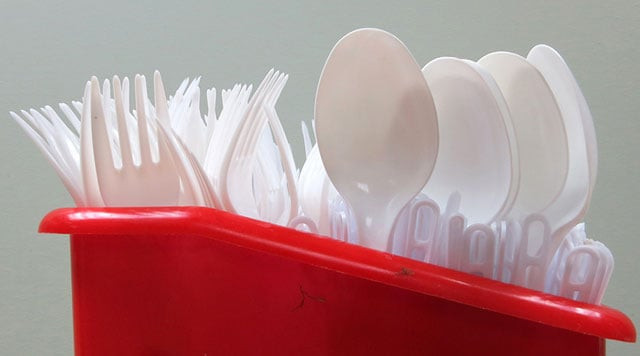France becomes world’s first country to ban plastic utensils
The new legislation will take effect from 2020

Although plastic bags are forbidden in other countries — including in some US states — no country seems to have embraced a plastic ban as sweeping as France’s will be. PHOTO: REUTERS
The new law, which is part of the country’s Energy Transition for Green Growth Act, — the same legislation that also outlawed plastic bags in grocery stores and markets beginning in July — provides exception for items made of compostable, biosourced materials.
Although plastic bags are forbidden in other countries — including some US states — no country seems to have embraced a plastic ban as sweeping as France’s will be, The Washington Post reported.
'India's cleanest village' clings on to its serenity
The general idea behind the law is to promote a “circular economy” of waste disposal, “from product design to recycling,” the newspaper quoted French lawmakers as saying.
French President François Hollande said the ban is part of a larger push intended “to make France … an exemplary nation in terms of reducing greenhouse gas emissions, diversifying its energy model and increasing the deployment of renewable energy sources” — starting, it would seem, with the forks and knives distributed at fast-food restaurants and the coffee cups in vending machines.
However, not all share the enthusiasm of France’s Socialist government, which has made environmental progress one of its main goals. Objections to plastic as a material are well known. For one, it does not biodegrade and only breaks down into smaller and smaller particles, which pose a significant danger for wildlife that cannot always distinguish it from food sources, particularly in oceans.
Aside from ecosystem disruptions, millions of barrels of oil are used every year in manufacturing plastic bags and utensils, playing what environmental activists call a significant role in climate change.
Indonesia environment team threatened with death investigating haze
Supporters of the ban wanted it to be introduced earlier, possibly as soon as 2017. But Ségolène Royal, the French environment minister, had initially considered it an “anti-social” provision, on the grounds that low-income families relied on plastic utensils and plates. The ban was then postponed until 2020.



















COMMENTS
Comments are moderated and generally will be posted if they are on-topic and not abusive.
For more information, please see our Comments FAQ